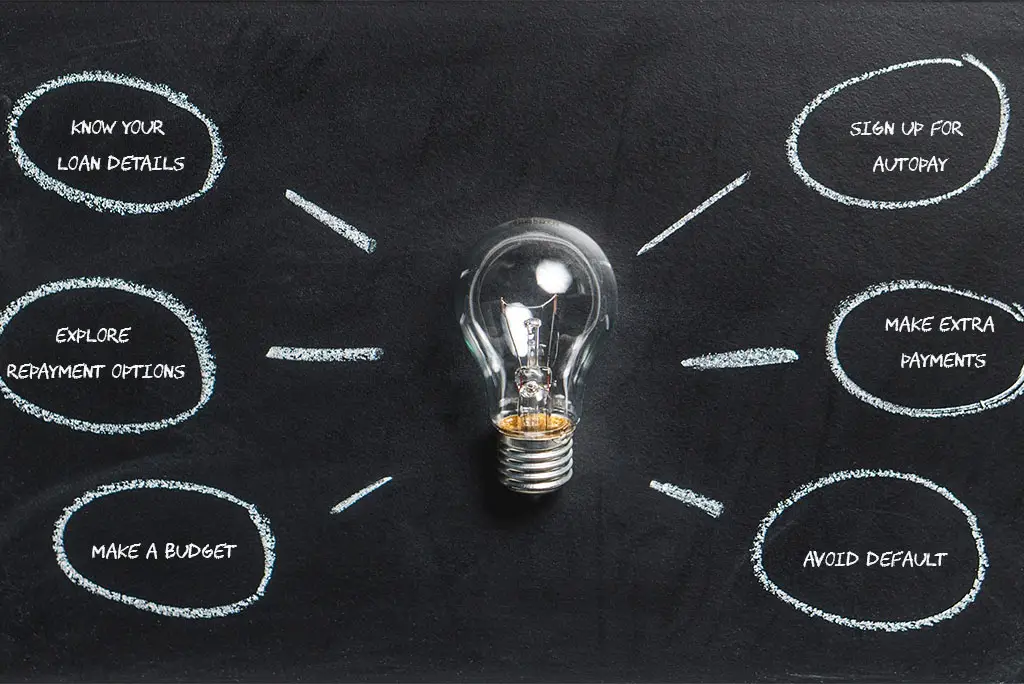As a student loan borrower, you may have wondered if paying off your loans using a credit card is possible. While the idea may seem appealing initially, it’s only sometimes the best option. In this blog post, we’ll explore the pros and cons of paying off student loans with a credit card and some strategies for prioritizing which loans to pay off first.
Pros and Cons of Paying Student Loans With a Credit Card

Can you pay student loans with a credit card? The answer is yes. But, it’s important to understand the potential benefits and drawbacks before paying.
Read also – Top Credit Cards with $1,000 Limit with Guaranteed Approval
Pros
- Cashback Rewards: Some credit cards offer cashback rewards for certain purchases, including student loan payments. Using a credit card that offers cashback rewards, you could earn some money back while paying off your loans.
- Convenience: Using a credit card to pay off your loans can be more convenient than writing a check or setting up automatic payments through your bank.
- Possible Lower Interest Rate: Depending on your credit score and the terms of your credit card, you may get a lower interest rate on your credit card than on your student loans. This could save you money in the long run.
Cons
- High-Interest Rates: Credit cards often have high-interest rates, especially if you have a lower credit score. If you can’t pay off your credit card balance in full each month, you could pay more in interest than you would have on your student loans.
- Fees: Some credit card companies charge fees for balance transfers or cash advances, which could eat into any potential cashback rewards or interest rate savings.
- No Grace Period: Credit card payments are due immediately, unlike student loans. If you can’t make your credit card payments on time, you could be hit with late fees or penalty interest rates.
Read – Average Credit Card Debt Statistics in 2023
Strategies for Paying Off Student Loans

If you’ve decided to pay off your student loans, these strategies can help you manage your loans better and prioritize which student loans to pay off first.
- Pay Off High-Interest Loans First
If you have multiple student loans, pay off the highest interest rates. This will save you the most money in the long run.
- Pay Off Loans With Small Balances
If you have some smaller student loans with balances under $1,000, consider paying those off first. This will help you knock out some loans quickly and give you a sense of accomplishment.
- Consolidate Your Loans
If you have multiple student loans with different interest rates, consolidating them into one loan can simplify your payments and lower your interest rate.
- Refinance Your Loans
If you have high-interest student loans, consider refinancing them to a lower interest rate. This will reduce your monthly payments and the amount of interest you pay over the life of the loan. It can save you money in the long run and make your payments more manageable.
Read – 6 Best Credit Cards for Young Adults in 2023
Following these pointers, you can decide which student loans to pay off first.
How to Make Student Loan Payments with a Credit Card
If you’ve decided that paying off your student loans with a credit card is the best option for you, here are the steps you’ll need to follow:
- Please contact your loan servicer
Not all loan servicers accept credit card payments, so you’ll need to get your servicer to find out if it’s an option for you.
- Choose a credit card
If your loan servicer does accept credit card payments, choose a credit card with a low-interest rate and any relevant rewards or cashback offers.
- Make the payment
You can pay online or over the phone. Pay off the entire balance each month to avoid high-interest fees.
- Please keep track of your payments
It’s essential to ensure that your credit card payments are correctly applied to your student loans.
Read – 5 Best Credit Cards After Bankruptcy
Alternatives to Paying Student Loans with a Credit Card

Paying off student loans with a credit card is generally not a good idea because credit cards typically have higher interest rates than student loans, so you’ll pay more interest charges over time. Additionally, most student loan servicers do not allow borrowers to make payments with a credit card, so you may not even have the option.
Here are some alternatives to paying student loans with a credit card:
- Make payments directly from your bank account
Most student loan servicers allow borrowers to set up automatic payments from their bank account. This is a convenient way to ensure your loan payments are made on time, and you won’t have to worry about missing a payment.
- Use a debit card
If you want to use a card to make payments, consider using a debit card instead of a credit card. This way, you can still make electronic payments without incurring high-interest charges.
- Look into loan forgiveness programs
Depending on your profession, you may be eligible for loan forgiveness programs that can help reduce or eliminate your student loan debt.
- Seek out alternative payment plans
Some student loan servicers offer alternative payment plans that can lower your monthly payments based on your income or other factors.
Read also – 750 Credit Score: Is it Good or Bad?
Tips for Managing Your Student Loans

Whether you decide to pay off your student loans with a credit card or not, managing your student loans can be daunting. Here are some tips to help you stay on top of your loans and avoid common mistakes:
- Please know your loan details
It is essential to know the details of your student loans, such as the amount you, interest rate, repayment terms, and the lender’s contact information.
- Make a budget
Create a monthly budget, including student loan payments. This will help you prioritize your expenses and make your payments on time.
- Consider consolidating your loans
Consolidating your loans can simplify your repayment process and possibly lower your interest rate. However, it may not always be the best option, so research before deciding.
- Sign up for autopay
Enroll in automatic payments to never miss a payment. Many lenders offer a slight interest rate reduction for borrowers who sign up for autopay.
- Explore repayment options
Several repayment plans, such as income-driven repayment plans, can make your payments more affordable. Contact your loan servicer to learn more about your options.
- Make extra payments
If you can afford it, consider making additional payments towards your student loans. This can help you pay off your loans faster and save money on interest.
- Avoid default
Defaulting on student loans can have serious consequences, such as damage to your credit score and wage garnishment. Contact your loan servicer to discuss your options if you struggle to make payments.
- Stay in touch with your lender
Keep your lender updated on any changes to your contact information or financial situation. This will ensure that you receive important updates and avoid potential loan issues.
Read – 10 Best Credit Cards for Wedding Expenses
Conclusion
Paying off student loans can be daunting, but staying on top of your loans and planning to pay them off is essential. While paying off student loans with a credit card may be an option for some borrowers, weighing the pros and cons before deciding is critical. By prioritizing your loans based on interest rates and balance sizes, exploring consolidation and refinancing options, and staying on top of your payments, you can save money and achieve your financial goals. Remember, managing your student loans is a marathon, not a sprint, so be patient and stay the course.
By strategically paying off your loans, you can save money and achieve your financial goals.
Read – Best Credit Cards for Travel, Rewards, and Low interest
FAQs
Q. Are there any downsides to paying student loans with a credit card?
A. One of the most significant drawbacks to paying off your student loans with a credit card is that if you don’t pay off your credit card in full each month, you can end up in much more debt than you started with. Also, if you skip or pay your credit card payments late, your credit score may be adversely affected, making it harder for you to get credit approval in the future.
Q. Can I close my student loans with a credit card?
A. Not all types of student loans can be paid with a credit card.
Federal student loans are usually paid only through a bank check or automatic withdrawal, while private student loans can be paid in cash. However, you can talk to your student loan officer to determine which payment options work for you.Q. Are there any fees to pay my student loans with a credit card?
A. Yes, there may be fees associated with paying off student loans with a credit card. For example, your student loan service provider may charge a processing fee for credit card payments, or your credit card company may charge a prepayment fee if you pay with a credit card.
Also, if you don’t pay off your credit card in full each month, you’ll pay interest on the balance.Q. What do you think I should pay attention to before closing my student loan with a credit card?
A. Before paying your student loans with a credit card, you should consider the fees associated with using a credit card. Also, keep in mind the risks and benefits of using this payment method. You should also consider other payment methods that may be better for your finances, such as setting up direct debits from your bank account or your son’s student loan.
Q. Does it make sense to pay student loans with a credit card?
A. Whether it’s a good idea to pay off your student loans with a credit card depends on your finances. Paying off your student loans with an A credit card is a good option if you can pay off your credit card in full each month and earn extra points or cash back by shopping on the card. But if you can’t pay off your credit card balance in full each month, you could end up in more debt than you started with, which can make it harder to meet your financial goals in the long run.

